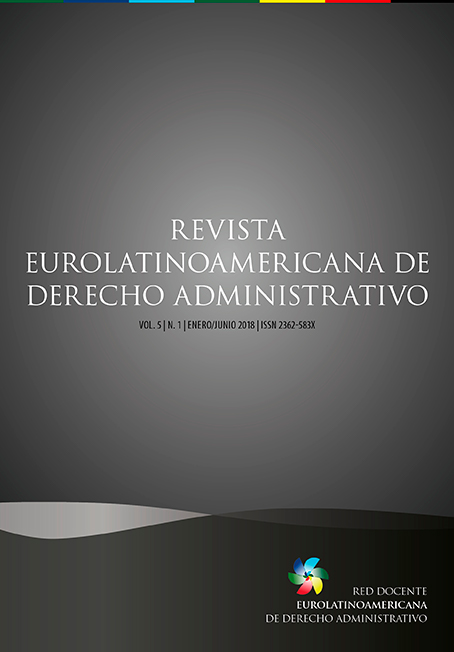Los instrumentos de gestión urbana promotores de los derechos económicos, sociales culturales y ambientales
DOI:
https://doi.org/10.14409/redoeda.v5i1.8714Palabras clave:
instrumentos de gestión urbana, hábitat, desarrollo territorial, integración socio urbana, expropiaciónResumen
El presente trabajo intenta esbozar el contenido y alcance de los instrumentos de gestión urbana y sus objetivos a los fines de alcanzar el desarrollo urbano territorial respetando sus componentes población, esto es, la sociedad con sus necesidades, hábitos y cultura y ambiente, con sus posibilidades geofísica, para satisfacer las necesidades del hombre en sociedad y en un territorio determinado, de manera que se establezca un nivel de equilibrio entre la satisfacción de las necesidades actuales con las necesidades de las futuras de generaciones, en términos del aprovechamiento sostenible de los recursos; reconociendo a la urbanización desde una perspectiva holística, como el desarrollo físico y la construcción de la ciudad, con una mirada social, de respeto y promoción de los derechos humanos fundamentales; analizando la expropiación como el instrumento jurídico de gestión urbana que resulta útil al urbanismo a los fines de procurar la integración socio urbana, a partir de la ley argentina de regulación dominial para la integración socio urbana.
Citas
GONZÁLEZ BARRÓN, Gunther, Derecho Urbanístico, Edición: 7ma. Ampliada, Ediciones Legales, ISBN: 9786124115370, Año: 2013.
GONZÁLEZ BARRÓN, Gunther, Derecho Urbanístico, Edición: 7ma. Ampliada, Editorial: Ediciones Legales, ISBN: 9786124115370, Año: 2013.
JORDAN, Ricardo y SIMIONI, Daniela “Hacia una nueva modalidad de gestión urbana”, Medio Ambiente y Desarrollo, Serie 48, pág. 18. Naciones Unidas. CEPAL. Santiago de Chile, abril 2002.
MARIENHOFF, Miguel S. Tratado de Derecho Administrativo, Tomo IV. Sexta Edición Actualizada, pág. 244.Ed. Abeledo Perrot, Buenos Aires, 1997.
MARIENHOFF, Miguel S. Expropiación y urbanismo, Revista Jurídica La Ley 19814-C, 910.
MASSIRIS CABEZA, Ángel. Cambios recientes en las políticas de ordenamiento territorial en América Latina, Gestión del Ordenamiento Territorial en América Latina: Desarrollo recientes”. En Proyección, 4, 2008. Ponencia en III Workshop de la Red Iberoamericana de Observación Territorial - 2013-10-09 / 2013-10-11- Santiago de Chile. Chile.
MINISTERIO DE AMBIENTE, VIVIENDA Y DESARROLLO TERRITORIAL (2004) “Guía Metodológica 2. Elementos poblacionales para el Ordenamiento Territorial”, Serie: Población, Ordenamiento y Desarrollo, Bogotá, Colombia.
QUETGLAS, FABIO “Un paso necesario hacia una sociedad más integrada”, Revista Digital Café de las ciudades, N° 173, julio 2018, Buenos Aires, Argentina.
QUIROGA GOMEZ, Zoila Madiú, de DIOS MARTINEZ, Ana, PEREZ RANGEL, Mercedes, “Enfoque poblacional en los planes de ordenamiento territorial”. Revista Retos Volumen 13 nro. 1 Camagüey – Ene-jun, 2019 Versión on line ISSN 2306-9155.
REESE, Eduardo, Instrumentos de gestión urbana, fortalecimiento del rol del municipio y desarrollo con equidad – Año 3-Octubre 2011, http://cafedelasciudades.com.ar/carajillo/10_art4.htm.
Descargas
Publicado
Cómo citar
Número
Sección
Licencia
Autores que publican en esta revista están de acuerdo con los siguientes términos:
- Autores mantienen los derechos autorales y conceden a la revista el derecho de primera publicación, con el trabajo simultáneamente licenciado bajo la Creative Commons - Atribución 4.0 Internacional que permite compartir el trabajo con reconocimiento de la autoría y publicación inicial en esta revista.
- Autores tienen autorización para asumir contratos adicionales separadamente, para la distribución no exclusiva de la versión del trabajo publicada en esta revista (ej.: publicar en repositorio institucional o como capítulo de libro), con reconocimiento de autoría y publicación inicial en esta revista.
- Autores tienen permiso y son estimulados a publicar y difundir su trabajo online (ej.: en repositorios institucionales o en su página personal) a cualquier punto antes o durante el proceso editorial, ya que esto puede generar alteraciones productivas, así como aumentar el impacto y la citación del trabajo publicado (Véase El Efecto del Acceso Libre).



























.png)





